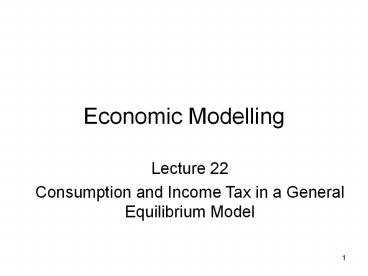Economic Modelling - PowerPoint PPT Presentation
1 / 17
Title: Economic Modelling
1
Economic Modelling
Lecture 22 Consumption and Income Tax in a
General Equilibrium Model
2
Household Problem in Presence of Consumption and
Income Taxes
(1)
(2)
(3)
3
First Order Optimisation Conditions in the
Presence of Taxes
(4)
(5)
(6)
(7)
(8)
(9)
4
Labour Supply in the Presence of Taxes
5
Determination of Real Wage Rate in the Presence
of Taxes
6
Labour Supply and Output in the Presence of Taxes
7
Leisure and Consumption in the Presence of Taxes
8
(No Transcript)
9
(No Transcript)
10
(No Transcript)
11
(No Transcript)
12
(No Transcript)
13
(No Transcript)
14
Efficiency Gains in the UK from elimination of
all taxes and transfers (Measured as a percent of
benchmark utility level of a representative
household) Equivalent Variation
3.715 Compensating Variation
-3.582 Efficiency Gains from Switching
to Labour income Taxes Equivalent Variation
-0.693 Compensating
Variation 0.697 Efficiency
Gains from Switching to Consumption
Taxes Equivalent Variation
2.967 Compensating Variation
-2.882
15
(No Transcript)
16
Key Results of Tax Reform Analysis
Optimal consumption tax rate given the revenue
constraint set equal to 80 percent of the
benchmark revenue level is 2.9 percent.
17
References
- Auerbach A.J. and L. J. Kotlikoff (1987), Dynamic
Fiscal Policy. Cambridge University Press. - Bhattarai K (2003) Macroeconomic Impacts of
Consumption and Income Taxes A General
Equilibrium Analysis University of Hull. - McKenzie Lionel W. (2002) Classical General
Equilibrium Theory, Massachusetts Institute of
Technology, Cambridge Massachusetts. - Debreu Gerard (1959) Theory of Value An
Axiomatic Analysis of Economic Equilibrium, Yale
University Press. - Rutherford T. F. (1995) ,Extension of GAMS for
Complementary Problems Arising in applied
Economic Analysis, Journal of Economic Dynamics
and Control, 19, 1299-1324. - Shoven J.B. and J. Whalley (1992) Applying
General Equilibrium, Cambridge University Press.

